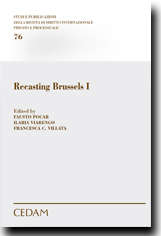El Sawah on Immunities and the Right to a Fair Trial
 Sally El Sawah, who practices at the French arbitration boutique Leboulanger, has published a monograph in French on Immunities of States and International Organizations (Les immunités des Etats et des organisations internationales – Immunités et procès équitable).
Sally El Sawah, who practices at the French arbitration boutique Leboulanger, has published a monograph in French on Immunities of States and International Organizations (Les immunités des Etats et des organisations internationales – Immunités et procès équitable).
The book, which is more than 800 page long, is based on the doctoral dissertation of Ms El Sawah. The main project of the author is to confront the law of sovereign immunities with human rights, and more specifically the Right to a Fair Trial.
The most provocative idea of Ms El Sawah is that the existence of rules of customary international law on sovereign immunities is a myth, and that the wide divergences of the national laws on the topic clearly show that there is no superior rule binding on national states.
After arguing that customary international law is essentially silent on the matter, the author makes her central claim. States should be considered as being essentially constrained by fundamentals rights when unilaterally adopting rules on sovereign immunities. As a consequence, and contrary to the case law of the European Court of Human Rights, the laws of sovereign immunities should not be considered immune from an assessment from a human rights perspective.
Ms El Sawah concludes that the French law of sovereign immunities should be significantly amended, in particular insofar as it distinguishes between immunity to be sued in court and immunity from measures of constraint (enforcement).
More details can be found on the publisher’s website.
The French abstract is available after the jump.
Le débat sur le conflit entre les immunités et le droit au procès équitable a pris toute son ampleur après les décisions décevantes de la CEDH, jugeant que les immunités constituent une limitation légitime et proportionnée au droit d’accès au juge. Or, il résulte de l’étude des fondements, sources et régimes des immunités et du droit au procès équitable que leur conflit dépasse leur antinomie étymologique : les immunités portent atteinte au droit d’accès au juge dans sa substance même.
L’imprécision et l’incohérence du régime des immunités étatiques aussi bien que l’absence de voie de recours alternative aux immunités des organisations internationales portent atteinte au droit d’accès concret et effectif au tribunal. Néanmoins, le conflit entre les immunités étatiques et le droit au procès équitable est moins problématique que le conflit entre ce dernier et les immunités des organisations internationales. Contrairement aux immunités étatiques qui n’ont qu’une source nationale, il existe un véritable conflit de normes de valeur égale entre le droit au procès équitable, droit fondamental en droit interne et international, et les immunités des organisations internationales, régies par des conventions internationales. La résolution du conflit entre le droit des immunités et le droit au procès équitable, qui ne mérite pas de se réaliser par le sacrifice de l’un au profit de l’autre et inversement, requiert l’intervention du législateur, compte tenu de la fonction politique des immunités et des principes de l’état de droit.
Une conciliation qui prend en compte les intérêts légitimes poursuivis par les droits en conflit est possible. Le droit au procès équitable ne doit plus constituer un motif d’exclusion des immunités. Il doit désormais servir à définir le régime des immunités des états et des organisations internationales. Si un déni de justice subsiste, le justiciable ne sera pas pour autant désarmé. Son droit de recours au juge sera préservé ; il pourra agir contre l’état du for pour rupture de l’égalité devant les charges publiques.
 The latest issue of the
The latest issue of the 
 The last issue of the Revue critique de droit international privé was just released. It contains four articles and several casenotes.
The last issue of the Revue critique de droit international privé was just released. It contains four articles and several casenotes.